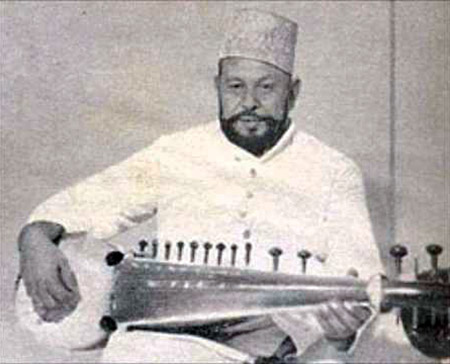also known as:
Gulam Ali Gharana
Gulam Ali Sarod Gharana
Gulam Ali Bangash Gharana
Gulam Bandigi Khan Bangash
Gulam Bandigi Khan Bangash moved from Afganistan to India where he worked as a horseman for Vishwanath Singh Maharaja. He learned music from Rewa’s Maharaja, Kamakhya Prasad Singh. He was not a professional musician, but he could play raga sangeet (Classical Music) on the rebab. He started to teach his son, Gulam Ali Khan to play the rebab, from the age of ten.
Gulam Ali Khan
Gulam Bandigi Khan’s son, Gulam Ali Khan became a disciple of Vishwanath Singh Maharaja, who was an excellent musician. The Maharaja learned to play the dhrupad, hori, dhamar and played the rebab and the vina as well. Gulam Ali was 25 years old when his father died, but he could play very poetically on his instrument so the Maharaja told him to travel all over India to give concerts on his rebab, “which he could play in bin-style”. The Maharaja of Gwalior gave a house to Gulam Ali in the centre of Gwalior, when he joined the court as a musician. Nanne Khan (d. 1907) was Gulam Ali Khan’s younger son. He grew up in Gwalior and had three sons. The best known musician of them is Hafiz Ali Khan.
Hafiz Ali Khan
(1882-1972)

|
Hafiz Ali Khan: Raag Bilaskhani Todi (1968)
|
He learned from his father as well as from his uncle, Murad Ali Khan. He also learned to play the sarod from Wazir Khan, the master of Senia Rampur Gharana, the dhrupad from Ganeshilalji of Mathura and the thumri from Bhayya Ganpat Rao. He became the court musician of Gwalior. In 1952 he was awarded with the Sangeet Nathak Akademi Award, and in 1953 he joined the Academy as a member. In 1960 he got the prestigious Padma Bhushan title. His music was influenced by the khyal style. One can easily hear this in his son’s, Amjad Ali Khan’s play. The two sons of Amjad Ali Khan: Amaan Ali Bangash and Ayaan Ali Bangash give concerts all over the world these days.
related materials :
Sudeshna Bhattacharya interview
related links :
Amjad Ali Khan
Sudeshna Bhattacharya